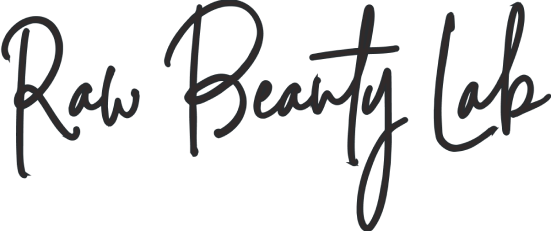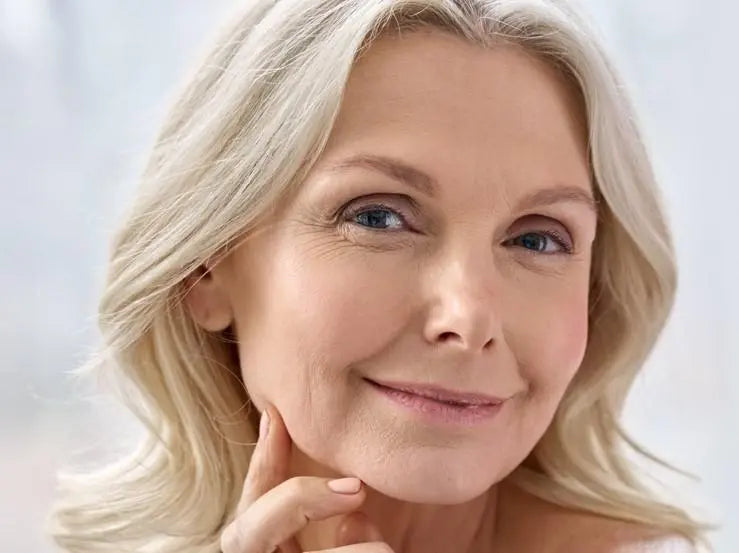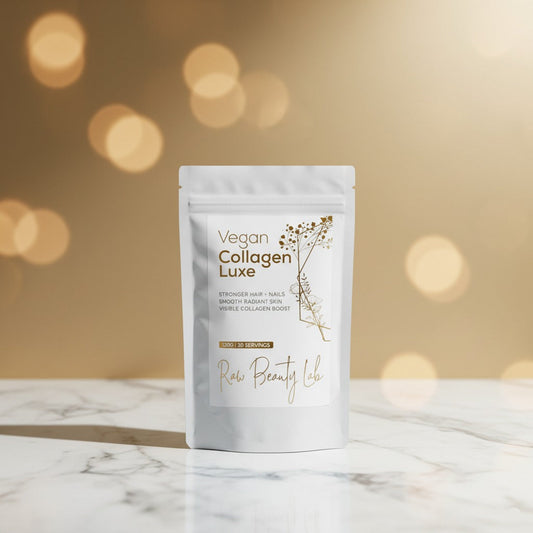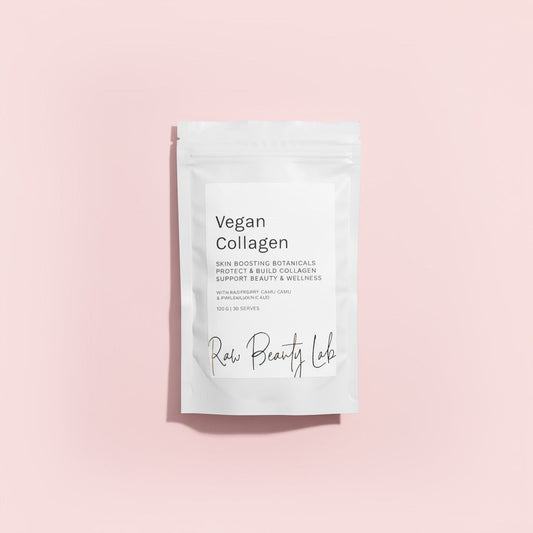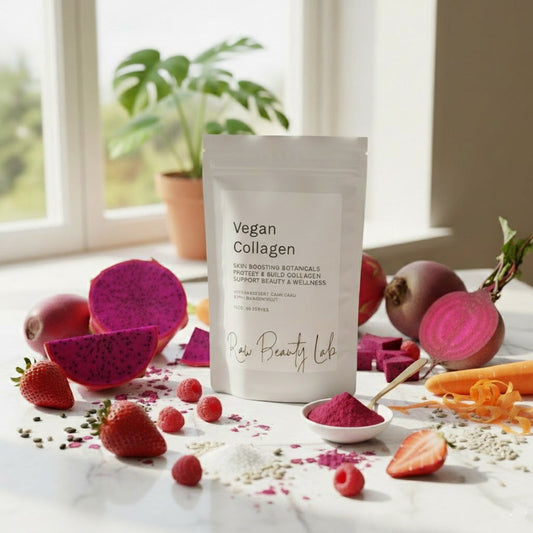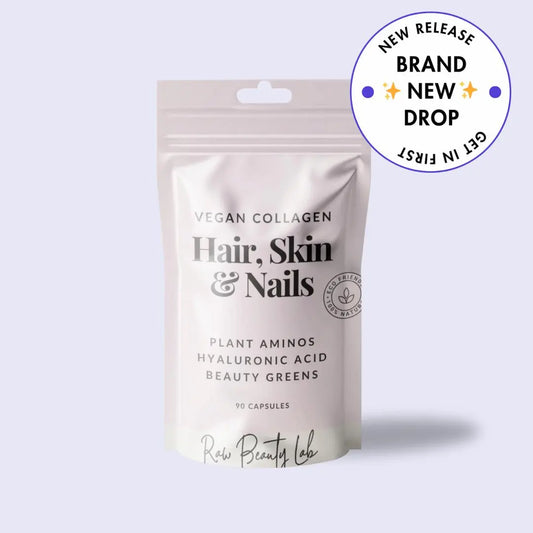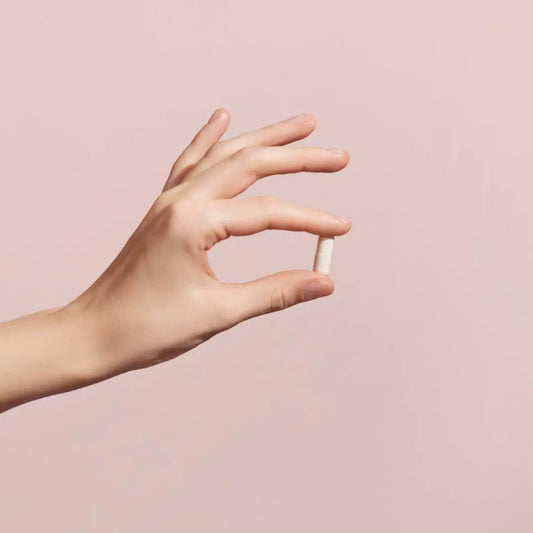Table of contents
Collagen - it’s been the talk of the town for recent years in the beauty industry, making an appearance in everything from serums to supplements, and with good reason! Making up 30% of the total protein in the body, it’s the most abundant protein responsible for maintaining a youthful appearance. But when should you actually start taking a collagen supplement and what are the key signs to look out for?
Although your body is capable of making this wonder protein, our ability to produce it declines over time (*sigh*). We lose 1% of collagen every year past the age of 25 years, with the decline being so gradual, you probably won’t even realise you’re deficient in the protein (just like how your mum would gradually mash more and more broccoli into your pasta without you realising). Whilst eating a superfood rich diet (yes that does include the aforementioned broccoli) is a great way to help your body continue to produce collagen and slow down the rate of collagen loss, a collagen supplement can help give you the additional boost you might need to see visible results. But how can you tell when you should start taking a supplement?
1. Fine lines, crepey skin, sagging or 'hollowness'
Your skin will probably show you one of the most visible signs of not producing enough collagen with an increased appearance of fine lines and wrinkles. Additionally, a lack of collagen also reduces the fullness of skin around your eyes and cheeks, making the skin appear thinner and hollower (and making your cheeks less "pullable" by your aunts and uncles – there’s always a silver lining!). The issue here remains in the delay between the point of collagen loss and the visible appearance of wrinkles on your face. Studies have established that around 25 years is when most people peak on their collagen production, so instead of trying to treat a collagen deficiency, taking it early on as a preventative measure is probably going to work most effectively in ensuring your canvas stays wrinkle free.
2. Dull or weak hair and early greys
Just like your skin, dull weak hair is a typical sign of collagen deficiency as the roots of your hair become weaker and start to fall out more often. The greying of your locks, initially round your hairline and your temples, is also another sign of collagen deficiency. This is because collagen can function like an antioxidant and prevent the greying of your hair. Therefore, the loss of collagen would result in grey hairs indicative of a collagen deficiency.
3. Dry and brittle nails
The last of the vanity trinity most associated with collagen loss is the changes in your nails. Nails are primarily made of keratin – a protein that uses amino acids found in collagen. Therefore, a lack of collagen will reduce the structural integrity of keratin, making your nails dry and brittle and easily peelable. Although it’s one of the final location’s indicative of a reduced collagen production, it’s still a credible sign that you may need a collagen supplement
4. Stiff joints
A prime location for type II collagen, stiff joints are a major sign that you may not have enough collagen being produced at your joints. Developing pain in the wrists or knees are the most common locations for injury and wear as these joints are frequently used. Pain in your joints may also indicate a collagen deficiency as collagen has anti-inflammatory properties. Reduced collagen would result in increased inflammation and consequent pain in the joints.
5. Aching muscles
Aching muscles are also a sign you may need to supplement with collagen. As collagen comprises a key component of building muscle, it’s important for muscle recovery after a lot of movement or exercise. Additionally, collagen is responsible for connecting our muscles to our bones through tendons and ligaments. Consequently, a lack of collagen will cause these connections to become weaker and result in aches and pains when you move.
6. Cellulite
As with the skin on your face, the skin around your body can also be subject to dimpling in response to a lack of collagen. Under your skin, you have a layer of connective tissue that is made up of collagen, which is then followed by a protective fat layer. As the collagen in the connective tissue layer reduces, the skin gets closer to the fat layer (which isn’t as smooth), resulting in the dimpling of the skin that we see on the surface as cellulite.
7. Digestive issues
Another body part that may indicate a collagen deficiency is your gut. Collagen makes up a large part of the lining of your gut, releasing amino acids that help digest the food that travels through. If this lining wears down, the food you eat does not get digested effectively which may lead to bloating and poor nutrient absorption. Your gut lining also makes up a pretty large part of your immune system, preventing bacteria from your food from entering your bloodstream. Therefore, a compromised gut lining due to a lack of collagen may also increase the incidence of infection.
Your body may indicate more and more of these signs as you age so its good to be aware of them. However, its important to check out any abnormal aches or pains with your doctor before you embark on supplementing your body with collagen, just to make sure you don’t have any more serious underlying issues.
So you have identified some of the signs that you might need a collagen supplement- what type of collagen do you actually need and which supplements are best?
The Types of Collagen Protein and Where You Can Find Them
Type I
Type I collagen is present across your body - including in your skin, hair, nails, tendons, bones, ligaments, and in the lining of your gut and in your teeth. This form of collagen contributes to maintaining healthy plump skin and keeping wrinkles at bay. It’s also great for maintaining thick, shiny, shampoo commercial worthy hair (a mandatory flick of your hair is completely justified here).
Type II
Found mostly in the cartilage around your body and in the back of your eyeball, type II collagen helps your joints and tissues bear mechanical stress and absorbing shock (or what you and I recognise as cushioning the blow). It also helps to prevent abrasion between bones at joints such as your knees, elbows and wrists, enabling the bones to move smoothly and stopping you sound like a clacketing keyboard every time you move (believe me I’m grateful for it too).
Type III
Type III collagen can also be found in your skin. It also makes up a large part of your gut and your blood vessels and is the protein used to build your muscles. The functions of type I and type III collagen are relatively similar in the body, although the prevalence of type I collagen in the hair and skin ranks second to type I collagen. I should also mention at this point that type I and III collagen are also responsible for the production of specific amino acids that help maintain the health of your body including glycine – a very important amino acid involved in producing collagen but also runs a side hustle of helping to burn body fat (and who doesn’t want that?)
FAQs: Do You Need a Collagen Supplement?
What age should I start taking collagen?
Collagen production begins to decline around the age of 25, so starting a supplement in your mid-to-late 20s can help prevent early signs of aging and support long-term skin and joint health.
What are the signs that I’m low in collagen?
Common signs include fine lines, sagging skin, joint stiffness, weak nails, thinning hair, cellulite, and digestive issues. If you're experiencing more than one, it's likely your collagen levels are dipping.
Is it safe to take collagen daily?
Yes. A high-quality, plant-based collagen supplement can be safely taken every day to support natural collagen production, especially if it contains co-factors like vitamin C and antioxidants.
What’s the difference between marine, bovine, and vegan collagen?
Marine and bovine collagen are animal-derived, while vegan collagen supplements work by supporting your body’s own natural collagen production using plant-based nutrients. Our Vegan Collagen Luxe is 100% cruelty-free and clinically backed for results in just 28 days.
Can collagen supplements improve hair, skin, and nails?
Absolutely. Consistent supplementation can lead to stronger hair, firmer skin, and healthier nails — especially if your formula includes collagen-boosting ingredients like Vollagen®, vitamin C, and superfoods.
Which type of collagen supplement should you take?
Collagen supplements come in various forms, with the three main types being marine, bovine, and plant-based. Marine collagen is sourced from fish and often contains collagen types I and III, which are abundant in the skin, bones, and muscles. Bovine collagen is derived from cows and is rich in types I and III collagen as well. However, there is conflicting science surrounding some of the animal based collagen supplements available on the market and an increasing number of individuals are turning to plant-based collagen builders for a more sustainable, ethical, and allergen-friendly alternative.
Why choose a Vegan Collagen Supplement
Plant-based collagen builders stand out as the best choice for several reasons;
1. Higher bioavailability = better results
Plant-based collagen builders excel in terms of bioavailability and absorption. Contrary to misconceptions, these supplements can provide the necessary building blocks for collagen production while offering additional nutrients that support the absorption process. Ingredients like vitamin C, commonly found in plant-based sources, play a crucial role in collagen synthesis and enhance the effectiveness of these supplements.
2. Proven results for skin tightening and wrinkle smoothing
Vegan Collagen supplements contain incredibly powerful plant-based anti-ageing antioxidants. There antioxidants not only support the body's natural production of collagen but also helps to combat oxidative stress, promoting skin elasticity and firmness. A study of women aged between 40-60 years of age found that superfoods found in these supplements can radically improve skin youthfulness and deliver firmer, smoother skin in just a handful of weeks.
3. More environmentally friendly
Firstly, they are derived from natural plant sources like fruits, vegetables, and seeds, aligning with the principles of sustainable and eco-friendly living. Choosing a vegan collagen supplement promotes ethical practices and avoids the environmental impact associated with the fishing industry or traditional animal farming. Secondly, plant-based options are often allergen-friendly, making them suitable for a broader audience, especially for those with dietary restrictions or sensitivities. T
4. Beauty and wellness results
Lastly plant-based collagen builders offer a diverse nutrient profile, providing not only collagen precursors but also essential vitamins, minerals, and antioxidants that contribute to overall skin health and well-being. By opting for a plant-based collagen supplement, individuals can enjoy the benefits of collagen synthesis without compromising their values or the health of our planet. Our favourite is Raw Beauty Lab's Vegan Collagen Peptides
As consumers become more mindful of their choices, plant-based collagen builders emerge as the frontrunners, offering a holistic approach to skin and joint health that is not only effective but also aligns with ethical and sustainable lifestyles.
